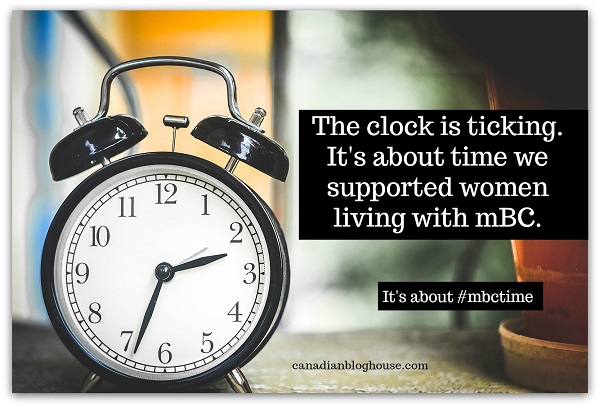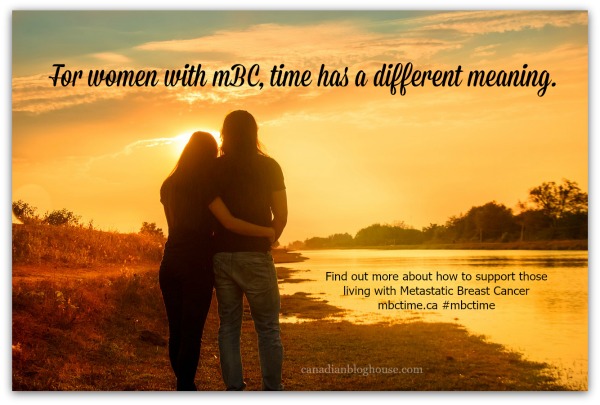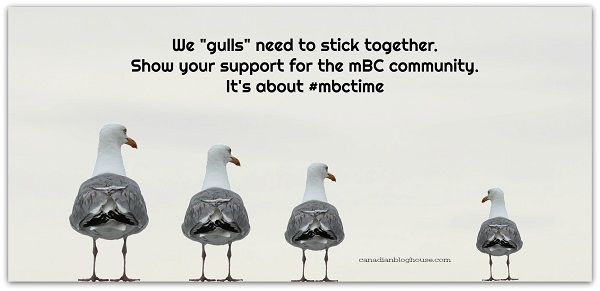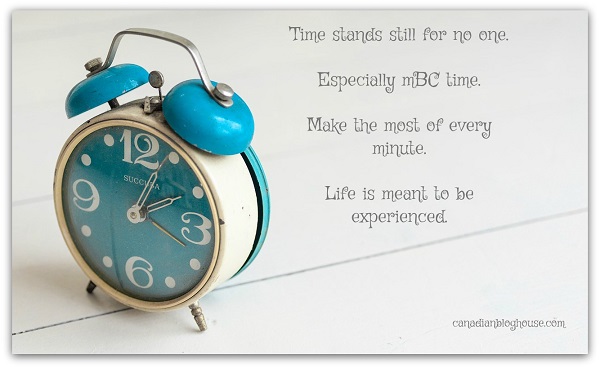
Canadian Blog House received compensation in exchange for this post about mBC (Metastatic Breast Cancer), an issue very close to our hearts. All opinions are our own.
I never had the chance to meet my maternal grandmother.
Metastatic Breast Cancer (mBC) took my grandma’s life at age 52. Just five months before my parents were married – and 12 years before I was born.
My mother was only 23 when my grandma passed away. Far too young to lose her mother.
I grew up seeing photos of my grandma, and hearing a few stories about her life. But the story I remember most is the one about how she died.
You see, my grandma had a secret, and she kept that secret for over a year.
She had found a small lump in her breast but she ignored it, assuming it was just a benign cyst.
By the time she finally sought medical attention for the lump, it was too late.
My grandma had mBC.

Understanding mBC
mBC, also known as Stage 4 or advanced breast cancer, is breast cancer that has metastasized (has spread to other organs in the body).
Today, when it comes to cancer, society is very much focused on survival. And why shouldn’t it be? We should all try to stay positive right?
After all, cancer can be beaten.
The message is positive and, for some women diagnosed with early stage breast cancer, they can beat this horrible disease.
Unfortunately, for those living with mBC, the reality isn’t as positive.
A few facts about mBC:
- mBC remains an incurable disease in need of further research and support. It is treatable but for women with mBC, treatment lasts for the rest of their lives.
- mBC is associated with an 18-24 month median overall survival (i.e. for half of women living with mBC, the life expectance is 24 months or less). It’s estimated that people with mBC have a 5-year relative survival rate of 22 per cent.
- Often, lengthy and inequitable wait times for access to treatment cause enormous physical, emotional, and financial strain on mBC patients at a time when they are trying to maintain the best possible quality of life.

How much do Canadians really know about mBC?
Not much:
- 50% of Canadians don’t know what mBC is.
- In stark contrast to the realities of mBC, 53% of Canadians believe mBC can be cured if caught early enough.
- Many Canadians underestimate the number of women in Canada who die from mBC. On average, it’s 12 each day. 44% of Canadians thought that number would be lower.
- 90% of Canadians believe that an early diagnosis will improve the prognosis of mBC, and nearly half of Canadians agree that breast cancer caught early will not spread. In reality, approximately 20-30% of women first diagnosed with early stage breast cancer will go on to develop metastatic disease in their lifetime. In addition, of the estimated 26,300 Canadian women that will be diagnosed with breast cancer in 2017, about 5-10% of them will be diagnosed with metastatic disease upon first diagnosis.
- On average, Canadians estimate that funding for breast cancer is split nearly in half between early stage breast cancer and mBC. The reality is that from 2000 to 2013, mBC-focused research made up only 7% of the $15 billion invested in breast cancer research by major government and nonprofit funders in North America and the United Kingdom.

I’ll never know why my grandmother ignored the symptoms of her breast cancer for so long. If she had sought treatment as soon as she noticed a lump in her breast, would she have survived?
Possibly.
Back then, breast cancer treatment was not what it is today. Treatments were crude, invasive, and horribly painful. Maybe this is why grandma waited so long to seek medical help. She knew the battle she would face if she indeed had breast cancer.
In reality, my grandma may have developed mBC anyway. She may have been one of the 20-30% of women first diagnosed with early stage breast cancer who, despite great advancements in treatment, go on to develop metastatic disease in their lifetime.

But at least my grandma might have had time.
Time to see her daughter get married.
Time to witness the birth of her first grandchild.
Maybe even enough time to meet me.

A Story Half Told
Chances are many of us have known someone living with mBC.
In addition to my grandma, I have known many other women who have since passed away from mBC.
Yet breast cancer conversations still focus around survival. This is only half the story.
Women living with mBC need our support just as much as women who have survived breast cancer.
Perhaps they need it even more.

It’s About mBC Time
It’s time to highlight the unique needs of women living with metastatic breast cancer (mBC) and give them the attention they deserve.
The Canadian Breast Cancer Network (CBCN), Rethink Breast Cancer (Rethink), the Quebec Breast Cancer Foundation (QBCF) and a leading research-based pharmaceutical company in Canada have partnered for a second year for the It’s About MBC Time campaign to raise awareness of the important challenges women with mBC face.
Time is the powerful differentiator between early stage breast cancer and mBC – a fact that many
Canadians don’t realize.
When you are fighting to survive breast cancer, your whole focus is on survival.
When you have mBC, survival is not part of the equation.
What is a part of the equation for women living with mBC, is time.
It’s time we started helping women with mBC make the most of their time.
It’s time to raise awareness and start talking about the unique needs and challenges of mBC patients, including lack of research and awareness, as well as the need for resources, funding, and access to innovative treatments.

We are all racing against the clock.
Time stands still for no one.
It’s time to have an important conversation about what time means to women living with mBC…
Please take a moment to watch this message. It’s powerful.
Think about what time means to you.
Time is precious – especially for those living with mBC.
For more information on how you can support women living with mBC, please visit the mBC time website.

